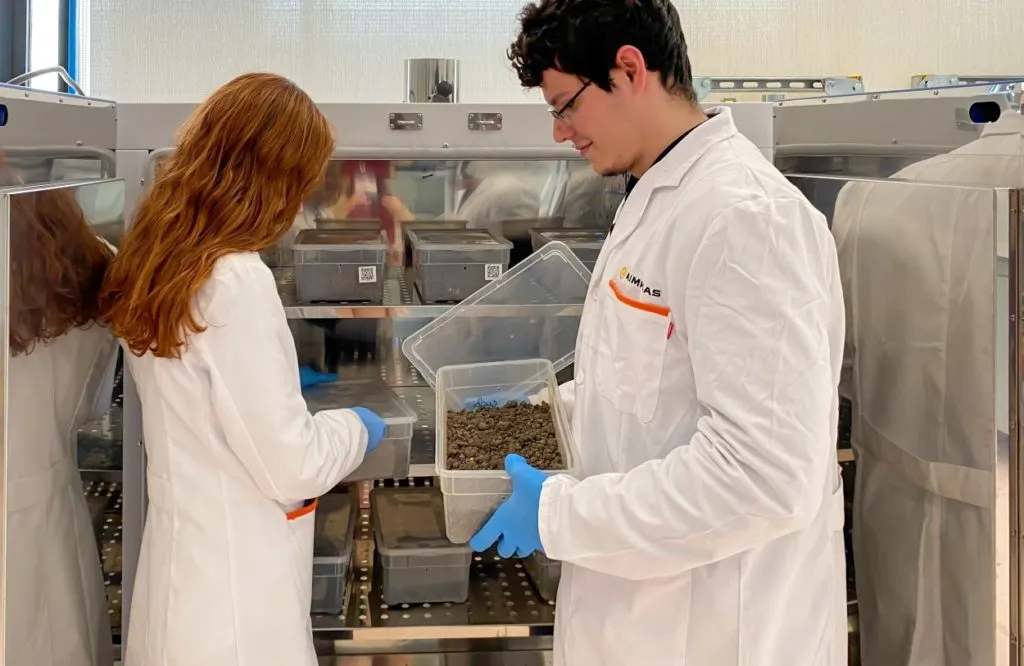What is plastics biodegradation?

Biodegradable plastics are plastics that can be degraded by the action of microorganisms existing naturally in the environment such as bacteria, fungi, or algae. They are a more sustainable alternative than non-biodegradable plastics of fossil origin. However, the transition towards using these materials faces the high economic competitiveness of the conventional plastics industry, so earning a place in the market requires major technological progress and financial investment.
What is biodegradability?
The term «biodegradability» is defined as the decomposition of an organic chemical compound by the action of microorganisms in the presence of oxygen (aerobic conditions) to result in carbon dioxide, water, mineral salts and new biomass.
How is the plastics biodegradation process?
- Phase 1. Colonization of microbes
In this phase, specialized microorganisms, such as bacteria and fungi, colonize the surface of the plastic material. These microorganisms can be naturally present in the environment or intentionally added to accelerate the biodegradation process; microorganisms use plastic as a source of nutrients.
- Phase 2. Release of enzymes
In this phase, microorganisms release extracellular enzymes on plastic. These enzymes are biocatalysts that accelerate decomposition since they break up the bonds of the plastic material and ease its biodegradation.
- Phase 3. Fragmentation and absorption of carbon
In this stage, plastic breaks down into smaller parts thanks to enzymes and other physical or chemical processes. Microorganisms can absorb these plastic fragments using the resulting products as a carbon and energy source for their growth and metabolism. During this process, plastic polymers break down into simpler units, such as oligomers and monomers.
- Phase 4. Biodegradation
In the last phase, the plastic fragments broken down are completely metabolized by microorganisms. These fragments are used as substrates for metabolic pathways in the microbial cells, where they break down even more into end products in the form of carbon dioxide, water, and biomass. The complete biodegradation of plastic involves transforming the plastic components into compounds that can be reintegrated in natural cycles, thus closing the life cycle of the material.
It is important to keep in mind that the duration and efficiency of each biodegradation phase may vary depending on factors such as plastics composition, the availability of degrading microorganisms and the environmental conditions.
Biodegradation environments
Biodegradation environments can be controlled such as composting or anaerobic digestion or natural and open, such as soil, fresh water and marine environments. Each one of these environments has a different type and number of microorganisms, as well as different temperatures, pH, and nutrients, among others. This series of factors means that each environment has a different degree of aggressiveness.
Industrial compostability generates the most aggressive environment since the high microbial load and high temperatures in controlled environments favour biodegradation to a greater extent. In contrast, the marine environment has a much lower concentration of microorganisms at low temperatures, making it the least aggressive environment of all.
The difference in the conditions of each environment creates the need for standards that assess biodegradability. Moreover, depending on the type of product, one study or another will be more suitable. For instance, biodegradation tests in soil are intended for agricultural products, biodegradation in fresh water for detergents and cosmetic products and biodegradation in the marine environment for sunscreen cream and fish farms. It is therefore very important to keep in mind the conditions and tests under regulations that have been carried out to ensure that the end of life of the product is appropriate when talking about the biodegradation of plastic materials.
AIMPLAS laboratories are accredited in accordance with international quality standard UNE-EN ISO/IEC 17025 and also by ENAC to carry out biodegradation studies in compost and soil, and disintegration studies at laboratory scale. In addition, we are also recognized by the certifying body TÜV Austria.